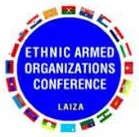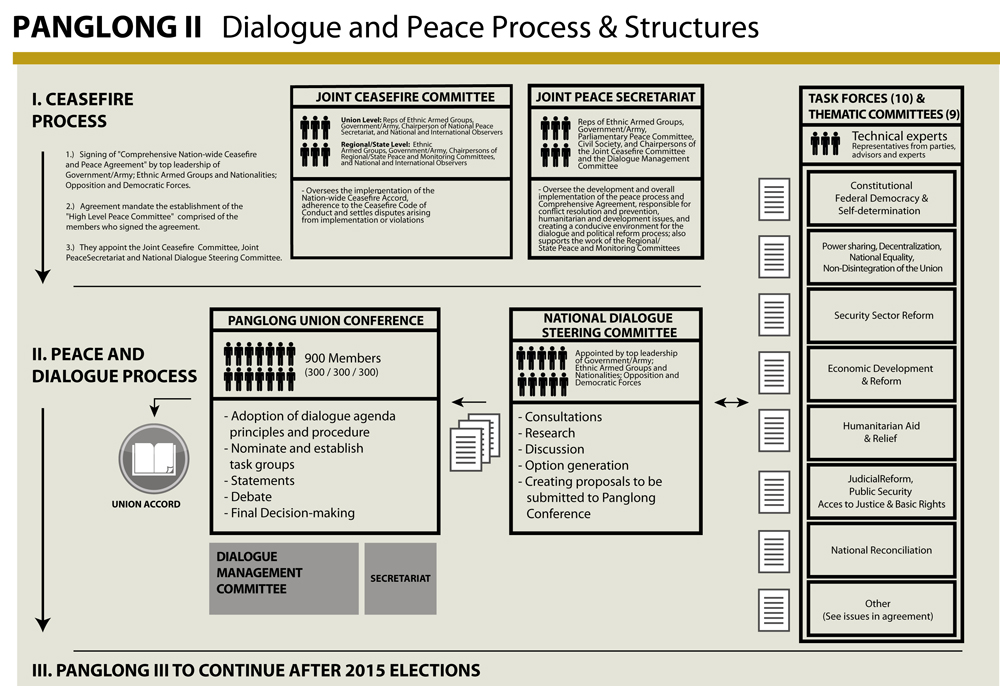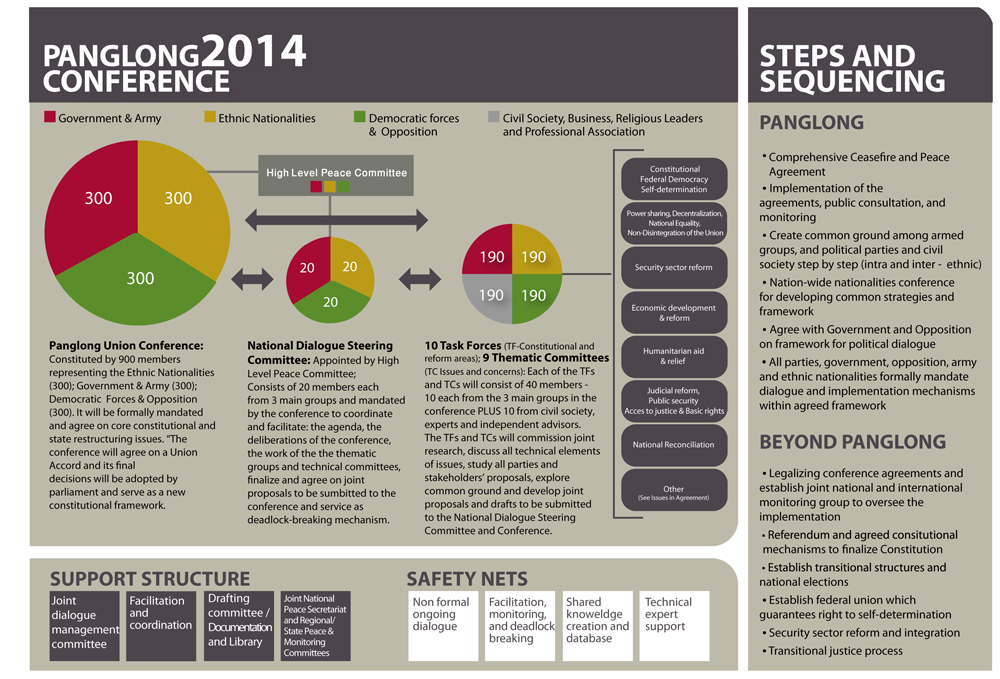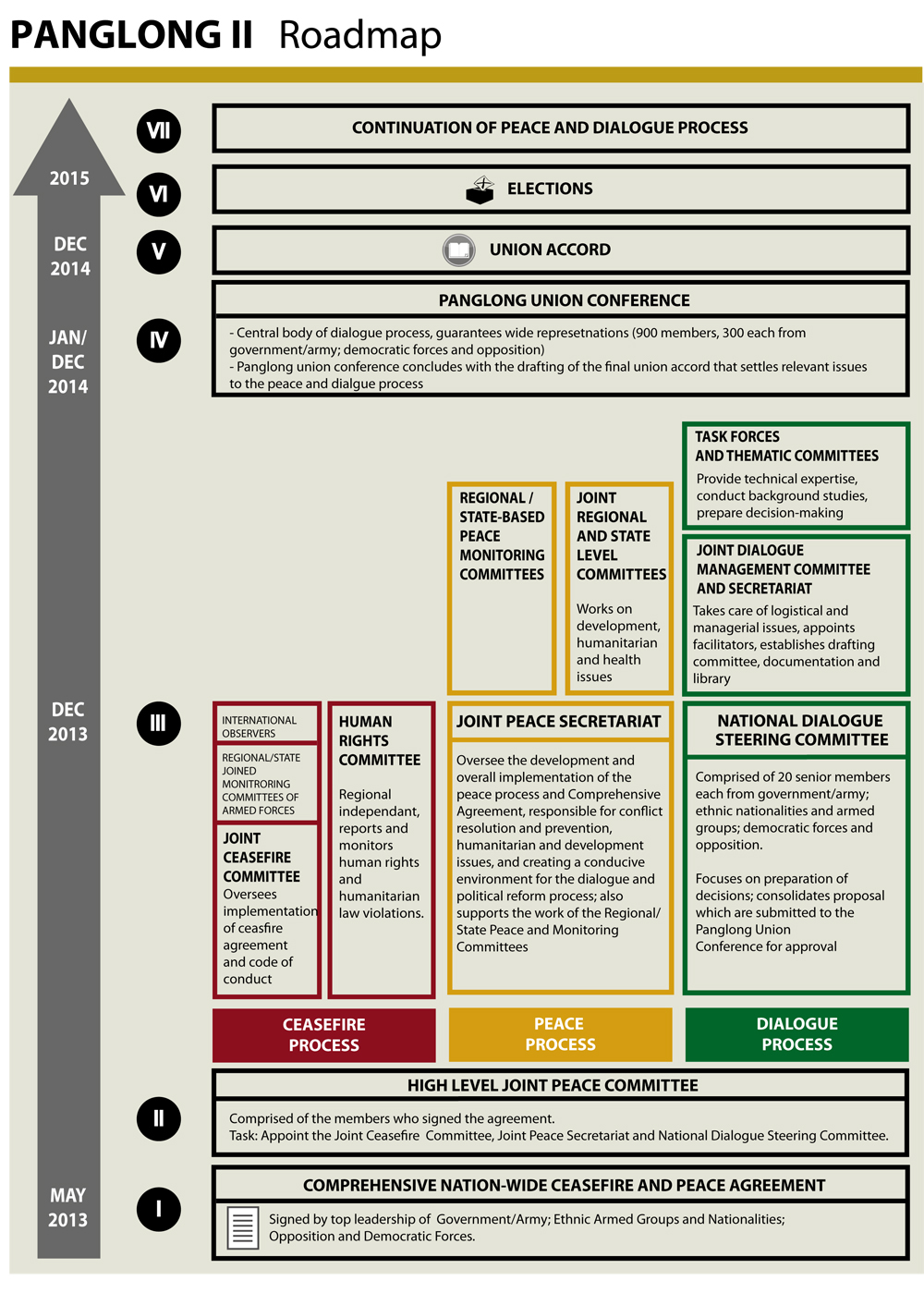Govt vs. Ethnic road map Panglong Agreement WGEC Political Framework EAGs proposal for nationwide ceasefire
Ethnic Peace Plan
All ethnic groups believe that only negotiations on the terms of the Panglong Agreement based on self-determination, federalism and ethnic equality will resolve the ethnic conflict in Myanmar. However, there is no cohesive plan or body that represents all armed groups.
United Nationalities Federal Council, the most active ethnic alliance, emerged with the lead of KIO in 2011 but does not represent all ethnic armed groups. After the emergence of the UNFC, the U Thein Sein government tried to gain peace with the UNFC. The UNFC tried to negotiate a Nationwide Ceasefire Agreement (NCA) with the U Thein Sein government by establishing a Nationwide Ceasefire Coordination Team (NCCT). After discussion with the NCCT and government negotiation team, the Union Peace-making Work Committee (UPWC), NCA emerged as a result. The UNFC decided to sign NCA all-inclusively in November 2013 at the Ethnic Armed Organizations Conference in Laiza. However, the U Thein Sein Government did not allow the Arakan Army(AA), Palaung State Liberation Front(PSLF), and the Myanmar National Democratic Alliance Army(MNDAA) from UNFC to sign the NCA.
The 8 ethnic armed groups that have signed the Nationwide Ceasefire Agreement (NCA) formed the Peace Process Steering Team (PPST) in 2016 to negotiate with the National League for Democracy government. At present, it consists of ten ethnic armed organizations (EAOs) who signed the nationwide ceasefire agreement (NCA).
The Northern Alliance was formed with the ethnic armed groups that have refused to sign the NCA in 2016. It is a military coalition in Myanmar composed of four ethnic insurgent groups: the Arakan Army (AA), the Kachin Independence Army (KIA), the Myanmar National Democratic Alliance Army (MNDAA) and the Ta’ang National Liberation Army (TNLA).
FPNCC, the most powerful ethinic armed group, was formed to negotiate with the government by the leading of Wa. Wa is the biggest ethnic armed group that refused to sign the Nationwide Ceasefire Agreement (NCA) and formed the Federal Political Negotiation and Consultative Committee (FPNCC) by cooperating with other ethnic armed groups (EAOs) which have not signed NCA.
All ethnic groups believe that only negotiations on the terms of the Panglong Agreement based on self-determination, federalism and ethnic equality will resolve the ethnic conflict in Myanmar. However there is no cohesive plan or body that represents all armed groups.
Presently the United Nationalities Federal Council (UNFC) is the most active ethnic alliance. However it does not represent all of the ethnic armed groups. Several of its members are involved in the Working Group on Ethnic Coordination (WGEC), which is administered and financed by the Brussels-based Euro-Burma Office (EBO). The EBO is the main organization responsible for liaising and coordinating with the MPSI.
Both the UNFC and WGEC have called for alternatives to the government’s BGF scheme and 2008 constitution. While the government claims that changes are possible by winning seats in parliament, ethnic armed groups are calling for political dialogue outside parliament.
Several of the ethnic armed groups’ main demands (excluding the government’s guiding principles that were previously mentioned) are:
- Amnesty/legalization of ethnic groups
- International mediators, monitoring bodies, public consultation
- Panglong terms and pan-ethnic dialogue
- Cultural protection
- Human rights and a special commission to ensure these rights are protected
- Environmental protection
- Resettlement/integration of refugees and soldiers
NATIONWIDE CEASEFIRE COORDINATING TEAM members:
| 1. Team Leader 2. Deputy Leader 1 3. Deputy Leader 2 4. Member 5. Member 6. Member 7. Member 8. Member 9. Member 10. Member 11. Member 12. Member 13. Member |
Nai Hantha, General-Secretary, New Mon State Party Padoh Kwe Htoo Win, Gen-Sec, Karen National Union Maj. Gen. Gun Maw, Deputy Commander-in-Chief, KIO Lt. Col. Kyaw Han, Arakan Army Ms Mra Raza Lin, Central Committee, Arakan Liberation Party Twan Zaw, General-Secretary, Arakan National Council Dr Lian Sakhong, Presidium, Chin National Front Col. Saw Lon Long, Democratic Karen Benevolent Army Shwe Myo Thant, Joint Secretary, Karenni National Progress Party Gen. Dr Timothy, Foreign Affairs, KNU/KNLA Peace Council Hkun Okker, Patron, Pa-O National Liberation Organization Sai Ba Tun, Central Committee, Shan State Progress Party Ta Ai Nyunt, Secretary-General, Wa National Organization |
Note: The Restoration Council for Shan State refrained from becoming a member of the NCCT, since the newly formed Committee for Shan State Unity (Oct 2013) of which it is a member, requires that it be consulted first.
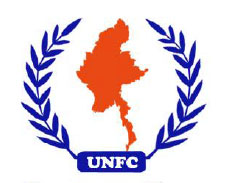 United Nationalities Federal Council (UNFC)
United Nationalities Federal Council (UNFC)
The UNFC is the latest coalition of ethnic armed groups. The UNFC is a transformation of the former Committee for the Emergence of Federal Union (CEFU) founded in November 2010. Currently, the UNFC are advocating for talks with the government as a united ethnic front. Their demands during negotiations with the government are based on the second draft of the 2008 Federal Constitution. ![]()
Objectives:
UNFC’s objectives: establish a Federal Union (in Myanmar), form a Federal Union Army (FUA), protect ethnic areas.
Membership (11):
CNF, KIO, KNU, KNPP, NMSP, SSPP, LDU, NUPA/ANC, PNLO, PSLF/TNLA, WNO
Organizational structure:
Each member group appoints 2-4 individuals to act as representatives in the UNFC. Presently, there are 22 members that make up the UNFC Council, 10 have been elected to serve in the central executive committee.
Federal Union Army: formed in December 2011, Commander in Chief Gen. Bee Htoo (from KNPP)
International campaign:
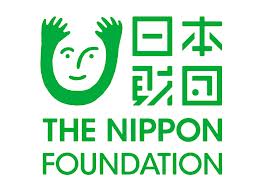 The UNFC works closely with the Nippon Foundation on its peace negotiation with the government. It secured a US$3million in emergency aid from the Nippon Foundation in Oct 2012, but their request for Japan to act as a mediator in negotiations with the government however has not received a response. A UNFC delegate also travelled to the US to talk about Myanmar’s ethnic peace processes with US and UN officials in Sept 2012, but there has been no follow up news.
The UNFC works closely with the Nippon Foundation on its peace negotiation with the government. It secured a US$3million in emergency aid from the Nippon Foundation in Oct 2012, but their request for Japan to act as a mediator in negotiations with the government however has not received a response. A UNFC delegate also travelled to the US to talk about Myanmar’s ethnic peace processes with US and UN officials in Sept 2012, but there has been no follow up news.
UNFC Six Point Plan:
|
UNFC’s objection to GVT peace plan:
Points 5-8 — “are measures to control our armed ethnic resistance organizations and mould them into an entity as desired by the government, before any political settlement is achieved.” |
|
| UNFC Demands:
UNFC has requested discussion on five main issues with the government
|
Informal agreement: (Nov.9, 2012)
|
Euro Burma Office & the Working Group on Ethnic Coordination
Euro-Burma Office
Director: Harn Yawnghwe
 The EBO has been a key figure in brokering peace talks between ethnic militia groups and the government. They convened a meeting of all ethnic groups involved in negotiations with the government and hosted monthly “Ethnic Coordination” meetings before the Working group on ethnic coordination (WGEC) was formed in June 2012 which it logistically and administratively supports. Several of the WGEC members overlap with the UNFC and Ethnic Nationalities Council (ENC).
The EBO has been a key figure in brokering peace talks between ethnic militia groups and the government. They convened a meeting of all ethnic groups involved in negotiations with the government and hosted monthly “Ethnic Coordination” meetings before the Working group on ethnic coordination (WGEC) was formed in June 2012 which it logistically and administratively supports. Several of the WGEC members overlap with the UNFC and Ethnic Nationalities Council (ENC).
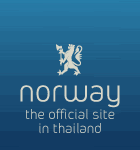 The EBO is currently also the conduit for funds from the Myanmar Peace Support Initiative to the Working Group on Ethnic coordination. It aims to coordinate ongoing ceasefire negotiations and develop a common peace plan. Activities funded by the MPSI are primarily training and capacity building, provided by international NGOs of the Peace Donor Support Group (PDSG).
The EBO is currently also the conduit for funds from the Myanmar Peace Support Initiative to the Working Group on Ethnic coordination. It aims to coordinate ongoing ceasefire negotiations and develop a common peace plan. Activities funded by the MPSI are primarily training and capacity building, provided by international NGOs of the Peace Donor Support Group (PDSG).
Working Group for Ethnic Coordination
The WGEC aims to coordinate ongoing ceasefire negotiations and develop a common peace plan. Activities funded by the MPSI are primarily training and capacity building that are provided by INGOs of the International Peace Support Group (IPSG).
The WGEC was conceived at a conference attended by ethnic armed groups that took place between Feb. 26-28, 2012; 6 months after President Thein Sein issued a formal invitation for peace talks. Leaders of 17 armed groups were gathered at the meeting, 9 of which had already made positive responses to the President’s call. These included 11 UNFC members and 6 UNFC observer groups RCSS/SSA, DKBA-5, KPC, non-BGF faction of the MNDAA (Peng Daxun, son of ousted leader Peng Jiasheng), KNLP and KNPLF (BGF).
The WGEC was created in June, 2012 and initially made up of representatives from ethnic armed groups and advisors from 7 states. Following the Ethnic Nationalities Conference in September, civil society organizations representatives (2 representatives each from youth, women and issue-based CBOs) were added. The WGEC meets once a month to work out a framework for upcoming political dialogue this includes: agenda, composition, mandate, structure, transitional arrangement and core principles, among others.
All of WGEC’s membership apart from advisers is derived from resistance and activist organizations. They do not receive salaries for their work and representatives from each group take turns in facilitating the monthly meetings. There are no permanent WGEC offices.
WGEC completed a draft of the framework for Political dialogue in April 2013 which they have submitted to the Myanmar Peace Center. However they are still waiting for feedback from all armed groups
Agreement on the following terms:
|
Two resolutions:
|
![]() ENC 2012 statement (16 Sept 2012)
ENC 2012 statement (16 Sept 2012)
![]() ENC 6-point program (16 Sept 2012)
ENC 6-point program (16 Sept 2012)
| WGEC MEMBERS | ||||
Resource Persons
|
CSO
women org. reps
youth org.reps
issue based org.reps
|
Ethnic States Representatives
|
Non-UNFC ceasefire groups
UWSA, NDAA-ESS, RCSS/SSA, DKBA-5, KPC, AA, ABSDF and NSCN-K are not members of the UNFC, but generally follow the same guiding principles: ethnic rights and federalism.
RCSS/SSA, DKBA-5, KPC, KNLP, KNPLF and non-BGF faction of the MNDAA are observers of the UNFC. However an important issue raised by individual ethnic armed groups about the UNFC is that it works too slowly and is not as effective in achieving its goals as they would like.
UWSA, NDAA, RCSS/SSA did not join the UNFC as official members, which they see as too Western oriented. The three groups have good relations with each other and maintain regular contact.
UWSA already has a self-administered zone as stipulated by the 2008 Constitution which consists of 6 townships in Shan state: Hopang, Mongmao, Pangwaing (Pangwai), Namphan (Nahpan), Metman (Markmang) and Panghsang (Pangkham). Its official name was announced by decree on 20 August 2010. The division is set to be self-administered by the Wa people, but is administered by the UWSA aka the official Wa Special Region 2 of Shan state.
DKBA-5 and KPC maintain close relationships with their former mother organization KNU and generally follow its leadership. However, they have not joined the UNFC because they do not agree with all their principles and prefer to negotiate with the government on their own terms.
ABSDF and AA are also unofficially following UNFC policy.

